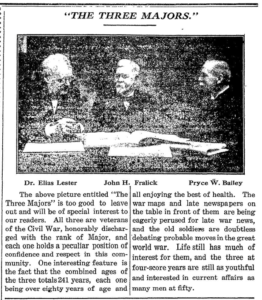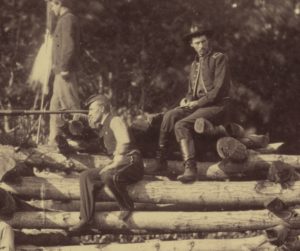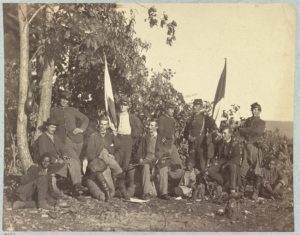The three Majors (1916)
15 November 2022
A clipping from the front page of the Seneca (NY) County Courier-Journal of 25 May 1916, online from NYS Historical Newspapers.
The Major in the center, John H. Fralick, was a Lieutenant and Acting Signal Officer on the Maryland Campaign of 1862, detailed from his regiment, the 34th New York Infantry.
US Signal Officers on Elk Ridge (1862)
13 November 2022
Credited to Timothy O’Sullivan, but probably by Alexander Gardner, this photograph is titled Signal tower on Elk Mountain, Maryland, overlooking battlefield of Antietam, and was taken in late September or early October 1862, not long after the battle of Antietam. It is one of several taken of this place and these men.
Here’s a blow-up of the two officers seen in this view.
The man seated at the top is Lieutenant Aaron Brainard Jerome of the First New Jersey Infantry, detailed as a Signal Officer since March 1862. The other, with the telescope, is Lieutenant Edward Corbin Pierce of the 3rd Maine Infantry, a Signal Officer since December 1861. Not in this view was the third officer at this station, Lieutenant Frederick Wooster Owen, detailed from the 38th New York Infantry.
Standing on the ground at the left is Private Robert J. Morgan, on detail from the 3rd Maine, as is the flagman on top, Private Harrison Winslow “Harry” Gardner.
Although it was the site of a signal station the day of the battle, neither the log tower nor these officers were there on Elk Ridge on 17 September; the tower built afterward, Lieutenants Pierce, Jerome, and Owen assigned on September 20.
Here’s a lovely photograph of the group of signalmen on Elk Ridge, also by Gardner, titled Signal Corps Detachment, Elk Mountain, Md., October 1862.
… a group portrait that may have been taken on a different day [from those of the signal station]. Seated against the tree to the left is Private Morgan. Lieutenant Owen is posed seated with his left hand on his thigh in front of and to the left of the white signal flag; the man seated to the right of him, a telescope in his lap, is Lieutenant Jerome. Standing behind Jerome to the right is Private Gardner … And finally, the last seated officer on the right is Lieutenant Pierce. (The black men in this scene are servants.)
_____________________
Notes
My copy of the top photograph is from the Library of Congress, online, as is the group photograph below.
Details about these pictures from William A Frassanito in Antietam: The Photographic Legacy of America’s Bloodiest Day (1978).
G.H.T. Ferdinand Axt passport application (1870)
11 November 2022
Gottfried Heinrich Theodor Ferdinand Axt was an acting Hospital Steward with his regiment, the 20th New York Infantry, on the Maryland Campaign of 1862. Like many in the regiment, he was born in Germany, but had excellent English as well.
He was later commissioned an Assistant Surgeon, first of Volunteers and then in the Regular US Army. This suggests prior medical training, perhaps in Germany, though I’ve not yet found evidence of it.
In January 1870, a month before he resigned his US Army commission, he applied for a passport in Washington, DC indicating he was planning travel overseas. This lovely document helped me nail down his full name along with place and date of birth, and includes details of his physical appearance. I found it online via Ancestry.com.





